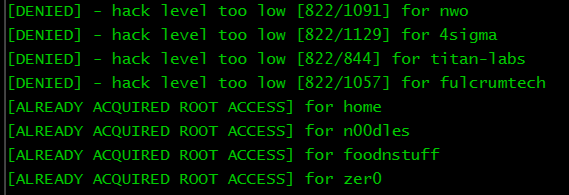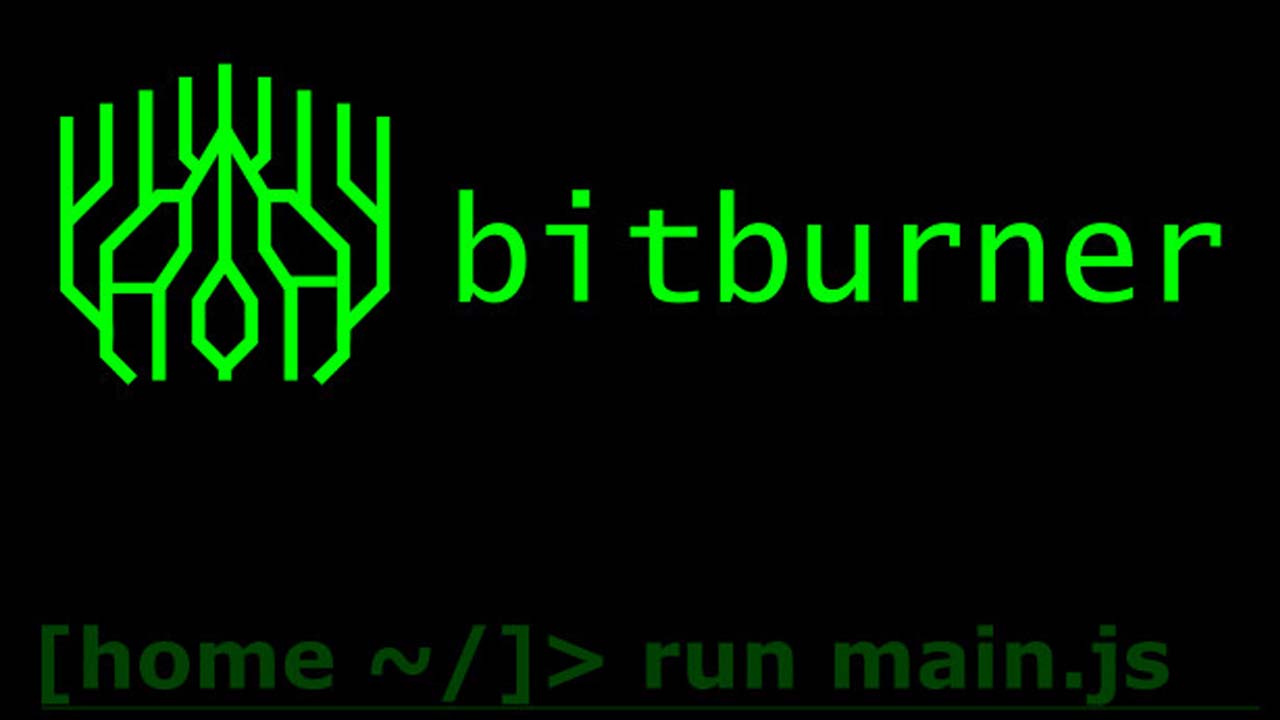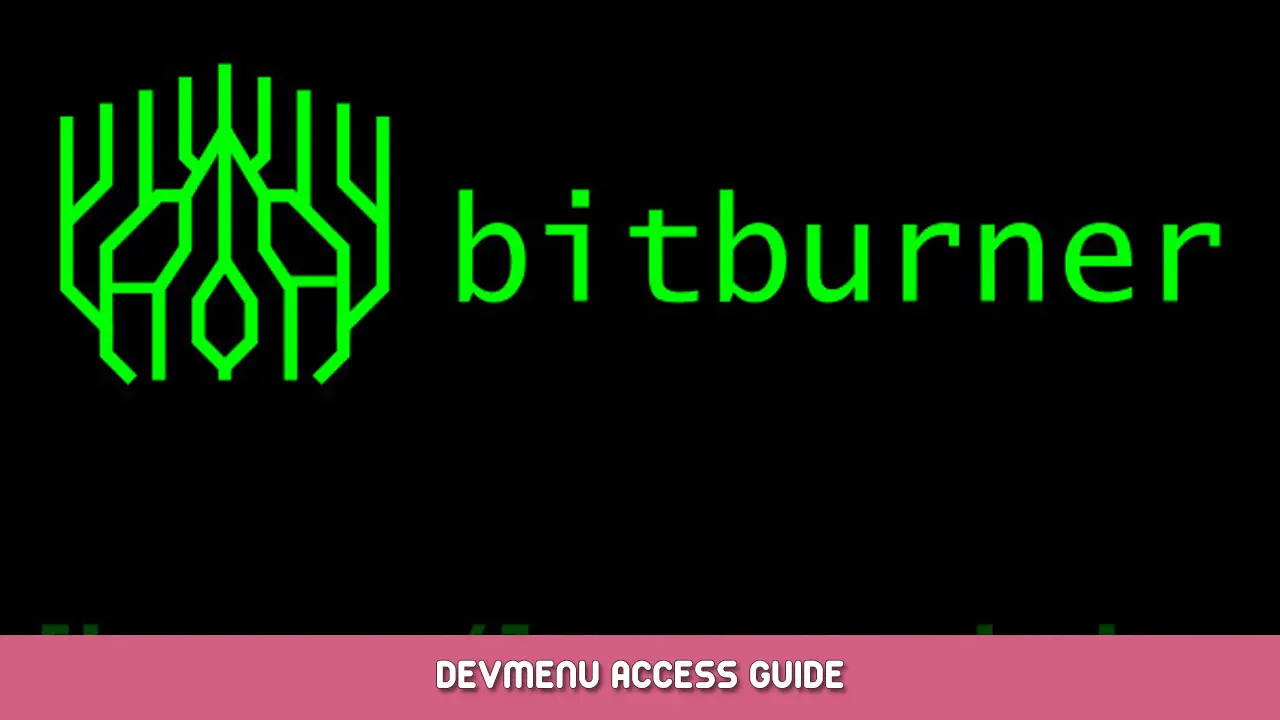Attempts to gain root access to all servers and present them in an easy-to-see and use format.
Aperçu
This script gets all servers, opens all ports possible, and attempts to gain root access, all while presenting the user with easy-to-read and useful information.

Comment utiliser
Create each script below and paste the code appropriately.
Run the script!
Commandes:
run RootAccessor.ns
Runs the script against all servers. Displays results.
run RootAccessor.ns -h
brings up the help menu for the script. The script does not process any further if it contains « -h » as an argument.
run RootAccessor.ns -s
lists all servers with root access as a space-separated list if users want to utilize them as arguments in other scripts.
run RootAccessor.ns joesguns n00dles max-hardware
attempts to gain root access on target servers (each argument is a server name).
run RootAccessor.ns joesguns n00dles max-hardware -s
run RootAccessor.ns -s joesguns n00dles max-hardware
run RootAccessor.ns joesguns n00dles -s max-hardware
« -s » can be added as an argument at any time.
RootAccessor.ns Script
Create a new script with whatever name you’j'aimerai. J'ai appelé le mien « RootAccessor.ns ». Paste the below code into it. Il contient 3 functions that make up the entire script.
/** @param {Ns} ns **/
importer {allServers} depuis "./lib-getServers.ns";
export async function main(ns) {
var approved = [];
var deniedhack = [];
var deniedports = [];
var denied = [];
var other = [];
var files = [0, 0, 0, 0, 0];
var maxPorts = 0;
//suppress all default log messages
ns.tail(); ns.disableLog('ALL'); ns.clearLog();
//check for help argument.
si (ns.args.includes("-h")) {aide(ns); retour;}
ns.print("For script help use argument '-h' ");
ns.print("Executing...");
//process argument calls
var target = [];
si (ns.args.length > 0) {
si (ns.args[0] === "-s") {
target = await allServers(ns);
} autre {
target = ns.args;
}
} autre {
target = await allServers(ns);
}
//check max ports available to open
if (Ns.Fileexistes("Brutesh.exe")) {fichiers[0] = 1; maxPorts++; ns.print("BruteSSH.exe file exists");} autre {ns.print("BruteSSH.exe not found");}
si (Ns.Fileexistes("Ftpcrack.exe")) {fichiers[1] = 1; maxPorts++; ns.print("FTPCrack.exe file exists");} autre {ns.print("FTPCrack.exe not found");}
si (Ns.Fileexistes("relaysmtp.exe")) {fichiers[2] = 1; maxPorts++; ns.print("relaySMTP.exe file exists");} autre {ns.print("relaySMTP.exe not found");}
si (Ns.Fileexistes("Httpworm.exe")) {fichiers[3] = 1; maxPorts++; ns.print("HTTPWorm.exe file exists");} autre {ns.print("HTTPWorm.exe not found");}
si (Ns.Fileexistes("Sqlinject.exe")) {fichiers[4] = 1; maxPorts++; ns.print("SQLInject.exe file exists");} autre {ns.print("SQLInject.exe not found");}
ns.print("Maximum ports able to open: [" + maxPorts + "]\n");
//open all ports and attempt root access
for (const n of target) {
si (ns.serverExists(n)) {
const serverHackLvl = ns.getServerRequiredHackingLevel(n);
const playerHackingLvl = ns.getHackingLevel();
si (playerHackingLvl >= serverHackLvl) {
si (fichiers[0]) { ns.brutessh(n); }
si (fichiers[1]) { ns.ftpcrack(n); }
si (fichiers[2]) { ns.relaysmtp(n);}
si (fichiers[3]) { ns.httpworm(n); }
si (fichiers[4]) { ns.sqlinject(n);}
gainRootAccess(n, maxPorts, approved, deniedports, denied, autre, ns);
} autre {
denied.push(n);
deniedhack.push("[DENIED] - hack level too low [" + playerHackingLvl + '/' + serverHackLvl + "] pour " + n);
}
}
}
//output results
if (deniedhack.length>0) ns.print(deniedhack.join("\n"));
si (deniedports.length>0) ns.print(deniedports.join("\n"));
si (other.length>0) ns.print("[ALREADY ACQUIRED ROOT ACCESS] pour " + other.join("\n[ALREADY ACQUIRED ROOT ACCESS] pour "));
si (approved.length>0) ns.print("[ROOT ACCESS APPROVED] pour " + approved.join("\n[ROOT ACCESS APPROVED] pour "));
si (ns.args.includes("-s")) {
ns.print("Copiable list of rooted servers:\n" + approved.join(" ") + other.join(" "));
}
}
function gainRootAccess(serveur, portCount, approved, deniedports, denied, autre, ns) {
si (!ns.hasrootaccess(serveur)) {
si (portCount >= ns.getServerNumPortsRequired(serveur)) {
ns.nuke(serveur);
approved.push(serveur);
} autre {
denied.push(serveur);
deniedports.push("[ROOT ACCESS DENIED] pour " + serveur + " - Not enough open PORTS");
}
} autre {
other.push(serveur);
}
}
function help(ns) {
const text = [
"<========================HELP=====================>\n",
"- Script takes in [N] arguments or none at all.",
" [N]: server names that you wish to be rooted.",
" par exemple.: run rootAccessor.ns n00dles joesguns zer0\n",
"- No args will attempt root access on all servers\n",
"- include argument '-s' as an argument to print",
" copiable list of all rooted servers\n",
"<=================================================>"
];
ns.print(text.join("\n"));
}
lib-getServers.ns Script
Create a new script named « lib-getServers.ns » and paste the below helper function.
/** @param {Ns} ns **/
export function allServers(ns, removePurchased=true) {
si (removePurchased) var pservs = ns.getPurchasedServers();
const nodes = new Set;
function dfs(nœud) {
nodes.add(nœud);
pour (const neighbor of ns.scan(nœud)) {
si (removePurchased) {
si (!pservs.includes(voisin)) {
si (!nodes.has(voisin)) {
dfs(voisin);
}
}
} autre {
si (!nodes.has(voisin)) {
dfs(voisin);
}
}
}
}
dfs("maison");
retour [...nœuds];
}
C'est tout ce que nous partageons aujourd'hui pour cela Brûleur de bits guide. Ce guide a été initialement créé et rédigé par Crunchynut. Si nous ne parvenons pas à mettre à jour ce guide, vous pouvez trouver la dernière mise à jour en suivant ceci lien.

